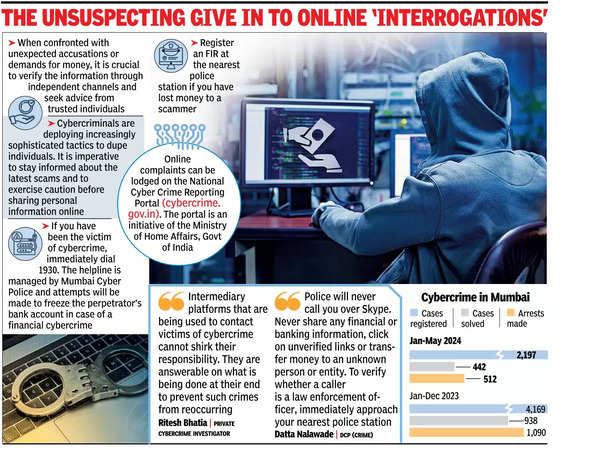[ad_1]

In early April, an aged man from Malabar Hill started to compulsively share his location with an unknown particular person each few hours. He went about liquidating fastened deposits that comprised his life’s financial savings with out saying a phrase to anybody. His household was oblivious to the nightmare unfolding till it was too late — he had been defrauded of over Rs 2 crore in a rip-off involving pretend digital detentions.
Cybercriminals are masquerading as legislation enforcement officers and deploying chillingly easy but efficient strategies to trick unsuspecting victims. Posing as policemen, CBI, or ED officers, these fraudsters launch on-line interrogations, sometimes by means of platforms like WhatsApp or Skype, the place victims might be monitored over the digital camera. The victims are remoted, forbidden from contacting anybody, and subjected to a barrage of intimidation to extract cash. “Interrogations” may vary from just a few hours to 2 or three days, and the victims are instructed that they’re underneath “digital detention”.

Within the Malabar Hill case, the aged man was given a “digital bond” of confidentiality by the fraudsters. He was requested to share his location so they might hold tabs on his whereabouts each time he stepped out. He liquidated his fastened deposits on being served a “letter from the Supreme Court docket” requiring him to submit all property for inspection by legislation enforcement companies.
In one other case, a south Mumbai resident was compelled to ship selfies each hour to his cyber captors. The fraudsters claimed that his Aadhaar card was implicated in cash laundering and he had been “digitally detained”. He was coerced into paying Rs 13 lakh to settle.
Scammers typically start by casting a large internet, calling up people with claims of medicine being discovered of their courier packages, or their private info being misused for cash laundering. The victims are then subjected to a high-pressure interrogation, full with threats of authorized motion or arrest. In a single incident, fraudsters instructed the sufferer that his cellular quantity popped up throughout the investigation of a prison case involving a former state minister from the NCP.
The emotional toll on victims is immense. A homemaker, focused in the same rip-off, was diminished to tears after being subjected to a barrage of abuse. She was threatened that her express movies had been leaked, leaving her shattered. “Using profanity by scammers is a tactic to imitate aggressive manner typically attributed to law enforcement officials in motion pictures,” stated cyber investigator Ritesh Bhatia. It might improve the sufferer’s perception within the legitimacy of the scenario.
To boost their credibility, cybercriminals have been recognized to create elaborate setups, resembling police stations, full with males donning uniforms and official-looking logos. In a single occasion, scammers used a pretend profile image of a policeman on WhatsApp and known as up a businessman, accusing him of being concerned in human trafficking. They despatched him a fabricated arrest warrant and seizure order through a web-based hyperlink. One of many scammers even impersonated a Supreme Court docket choose in a name with the sufferer. The fraudsters satisfied the businessman that he wanted to endure a “fund legalization course of” and deposit his cash in an RBI account. The rip-off, which unfolded over seven to eight hours, resulted in a lack of Rs 1.3 crore.
One other sufferer, a physician, was compelled to use for a pre-approved mortgage and switch the complete quantity to the fraudsters, who had instructed her that she was underneath digital detention and maintained a continuing watch on her by means of a Skype name.
“When confronted with a scenario that appears suspicious, do not hesitate to ask too many questions,” suggested Bhatia. “Fraudsters typically change into uncomfortable when confronted with scrutiny and can sometimes finish the decision abruptly,” he stated. Bhatia additionally identified the irony of our heightened consciousness in offline conditions in comparison with our on-line complacency.
[ad_2]
This Submit could include copywrite


